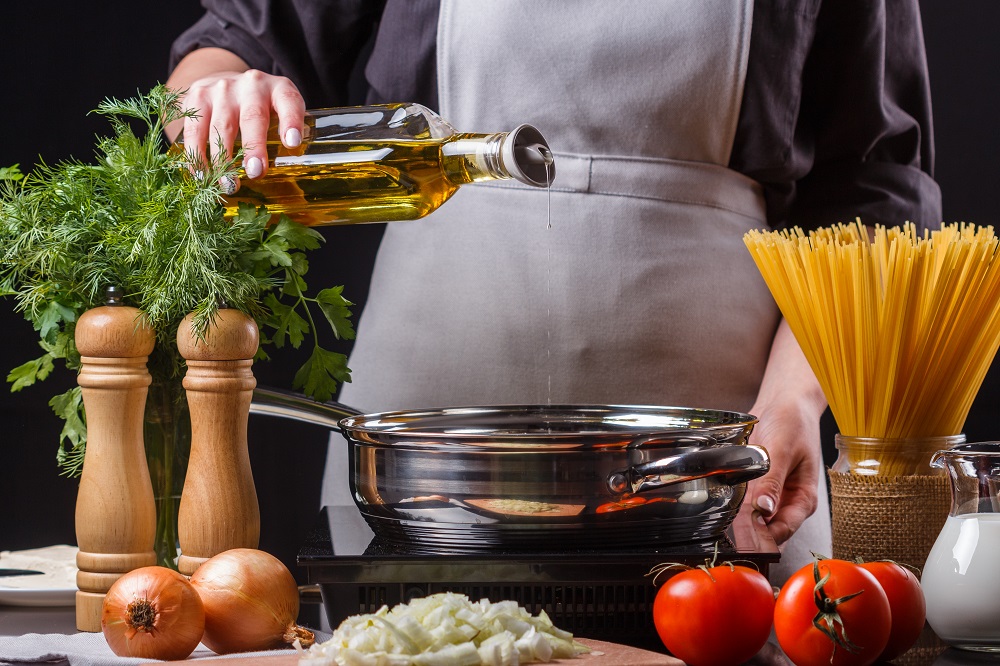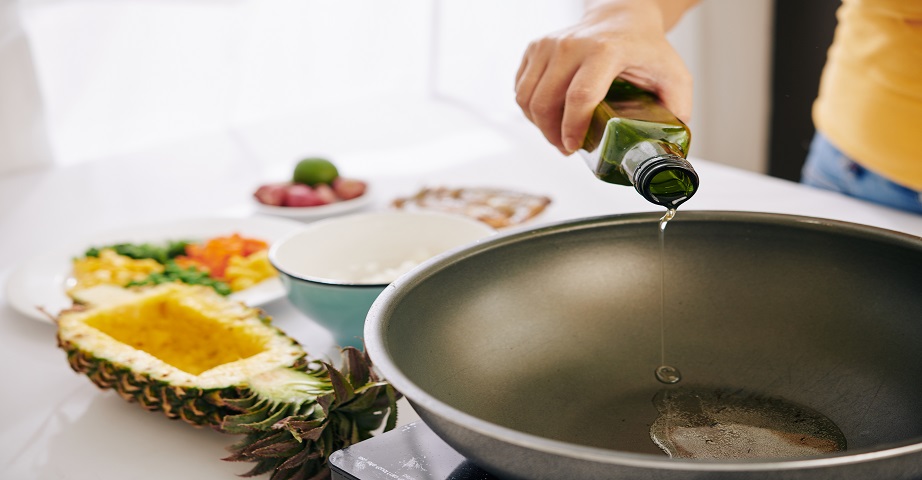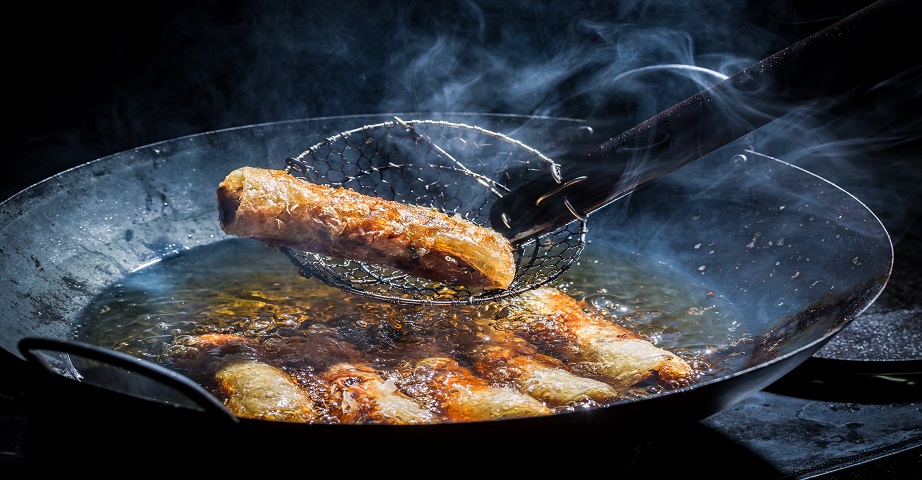What frying oil to choose?

Frying is one of the most popular methods of heat treatment of food. Although it is not considered the healthiest way to prepare meals, it is still very popular. But did you know that not all oils are suitable for frying? Some fats, although considered healthy and rich in nutrients, are only intended to be consumed raw. So, how to choose the right fat for heat treatment? Which frying oil is the healthiest? What is a smoke point, and what is the meaning of heat treatment of dishes?
Healthy fat, what is it?
Shop shelves cave in to a variety of fats and oils. On the shelves can be found natural vegetable oils, such as rapeseed oil or olive oil, or slightly more sophisticated proposals such as pumpkin seed oil or rice oil. Next to them, there are usually also various versions of popular fats, such as rapeseed oil with oregano and basil or olive oil with garlic and chilli. Animal fats such as lard and clarified butter are also available. The ordinary consumer, looking for frying oil, a multitude of options can make dizzy. What fat is the healthiest? Which oil to choose?
What is worth knowing when choosing oil for frying?
Available on the market oil proposals can be divided into vegetable and animal fats.
Vegetable oil is fat obtained from oilseeds. Vegetable fats, such as grape seed oil or sunflower oil, are very popular due to their composition. They are distinguished by a wealth of unsaturated fatty acids, such as monounsaturated fatty acids, e.g. oleic acid and polyunsaturated omega-6 or omega-3 acids, e.g. linoleic acid or alpha-linolenic acid, which, when are consumed in the right proportions, have a beneficial effect on human health. Exceptions among vegetable oils are fats such as palm oil and coconut oil, which are primarily a source of saturated fatty acids and contain trans fats, such as lauric acid.
Vegetable oils, in addition to valuable fatty acids, also provide the body with fat-soluble vitamins, such as vitamin A, E or D, as well as other valuable nutrients, such as dyes. The presence of individual types of fatty acids, their amount, type and ratio, are responsible for the quality of fat, as well as determine the nutritional value and aroma of the product and its physical and chemical properties.
On the other hand, animal fats are sources of saturated fatty acids that do not have a positive effect on the human body. Long-term delivery of saturated fats to the body may increase the risk of developing civilization diseases, such as atherosclerosis or coronary heart disease. Excessive supply of saturated fatty acids can also promote obesity.
Therefore, when looking for the right oil for frying, it is worth focusing on fats of vegetable origin, which are distinguished by a more beneficial composition of fatty acids and can have a positive effect on the human body. However, in order for it not to be too easy, it is worth knowing that not every vegetable oil is suitable for thermal processing. Vegetable oils can be divided into refined and unrefined. What does that mean? Which of them are healthy oils and which fat to choose when frying?
Recommended oils
Refined oils and unrefined fats
During choosing frying oil, it is worth paying attention to the processes that fat has undergone, and more specifically, whether it is refined oil or extra-virgin fat. Although it would seem that unrefined oil is definitely a better choice (after all, it is more natural and rich in valuable nutrients), this is not entirely true. Extra-virgin oil is a great solution, which, however, will not work in the case of heat treatment.
When frying, it is definitely better to reach for refined oil, which is one that has undergone purification processes, consisting in the removal of substances that are unfavorable in terms of quality and health. Refining involves heating the oil to a temperature of 200 degrees Celsius, which results in a prolonging its durability. It is also worth remembering that the refining process does not adversely affect the content of fatty acids in the product, but only increases the stability and durability of the oil. Although refining has many advantages, it should also be noted that according to a report by the European Office for Food Safety, the process can also result in an increased share of fat carcinogenic substances... When buying frying oil, after all, refined oil seems to be a better solution than virgin fat.
Fat smoke point - what is it?
Edible oils are also characterized by a specific smoke temperature, and due to different proportions and fatty acid content, they are distinguished by different drying rates in contact with air and a different way of responding to low temperature. But before we unanimously determine which frying oil is best, let's focus on the issue related to the smoke point... what is it?
The point of fat smoke is a kind of thermal threshold, that is, the moment when the heated oil begins to smoke. At the time of smoking, fat molecules are broken down into free fatty acids and glycerol, contributing to the formation of compounds that are unfavorable to human health, such as acrolein, which may, among others, have a pro-cancer effect. Smokes can be noticed with the "naked eye", as well as felt with the sense of smell and taste - an unpleasant smell and aroma of the dish is a sign that the used fat has undergone undesirable chemical reactions.
The higher the smoke temperature specific fats have, the more stable they are, and the thermal treatment has less effect on the production of harmful substances. Therefore, when looking for the best oil for frying, it is worth following the high temperature of smoke.

Which frying oil is best?
The best oil for frying should be matched to the planned time of thermal processing. However, regardless of the type of oil selected, it is worth remembering to always fry the dishes on well-heated fat, which will positively affect the nutritional value of the meal and reduce the degree of fat absorption by the dish. After frying, you should drain the excess fat from the dish using paper towels. Good habit is also used spices and herbs when marinating dishes that are used before frying - valuable ingredients contained in spices can reduce the occurrence of adverse fat oxidation processes. When heat treatment, you should also remember to fry each dish on a new portion of fat. It is best to use a pan with a thick bottom, which will allow regular distribution of heat. The fat used should also be adapted to thermal processing. What frying oil to use in the daily diet?
Shallow frying
For shallow frying, it is worth to choose refined oils rich in monounsaturated fatty acids, such as olive oil or rapeseed oil. During short-term frying, fats that are a source of polyunsaturated fatty acids, such as popular sunflower oil or linseed oil, can also work well. However, it is worth remembering that frying should be short, and the temperature should not be higher than 170 degrees Celsius.
During shallow and short frying, butter can also be occasionally used, but it is worth remembering that although it is a fat with an interesting aromatic note, it is a source of saturated fatty acids and should not be subjected to long-term heat treatment, or too often used in a healthy and balanced diet.
Deep frying
For deep frying, that is, for frying fries, angel wings, donuts or fish, you should choose fat with a high smoke temperature. The best solution seems to be refined rapeseed oil or refined olive oil. Oils rich in polyunsaturated fatty acids are much more susceptible to high temperature, which can adversely affect the human body during long-term thermal treatment, so during deep-frying should be abandoned e.g. from sunflower oil.
From a technological point of view, when deep-frying, stable saturated fatty acids such as lard, coconut oil, palm oil or clarified butter can also be a good solution. However, it is worth remembering that according to the principles of healthy eating, these are sources of saturated fatty acids, which should not be a permanent element of the daily menu due to the possible adverse effects on human health.
What oils should be avoided during frying?
Cold-pressed oils such as grape seed oil, avocado oil, soybean oil or sesame oil should be avoided during frying. These are fats intended only for raw consumption - they are great as an addition to salads or coleslaw. Cold pressed oils can also be used for dishes after their thermal treatment, for example to sprinkle a ready meal on a plate.
Unrefined fats contain valuable antioxidant compounds. However, high temperatures can cause formation of undesirable substances and adverse chemical reactions. Of course, oxidation processes occur not only in the case of virgin oils, but also in the case of refined fats. The difference is that in refined oils these reactions occur much more slowly.

The healthiest oil for frying, or what? What oil to fry choose?
The healthiest frying oil is refined rapeseed oil and refined olive oil. Due to the fact that the time of induction of oxidative processes in refined rapeseed oil is almost 5 hours, and the product is oxidation-resistant, using this type of fat during frying seems to be a good solution.
The advantage of refined, low-erucic rapeseed oil is not only the high temperature of the smoke, but also the easy availability of the product and its neutral taste and smell. Refined rapeseed oil does not change the aroma of dishes, and what is more, it is a source of valuable nutrients, including vitamin E or omega-3 fatty acids. In order to freely use the properties of fat, it is worth remembering about its proper storage - refined rapeseed oil should be located in a cool and shady place. The best solution is to store fat in a dark bottle, which will limit the supply of light to the oil and thus reduce the risk of rancidity.
Although refined rapeseed oil is a healthy oil, which seems to be the best fat for frying, on a daily basis it is worth using also other methods of heat treatment, such as baking, stewing or cooking, remembering that fat should be used in moderation, because its excess not only does not promote the maintenance of a healthy body weight, but also can increase the risk of developing many diseases.

